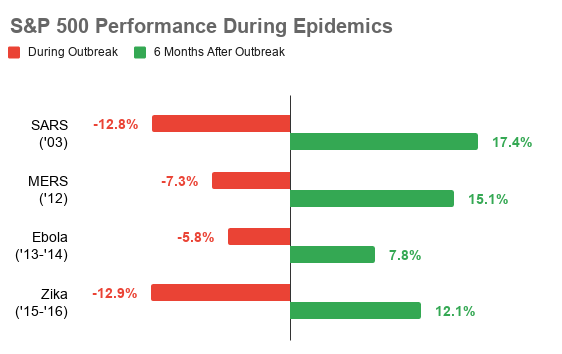After weeks of headlines about the coronavirus outbreak, markets have been caught in quick downward spiral. Here’s what you should know:
Why are markets so volatile?
Disease outbreaks are hard to predict and come with a great deal of uncertainty that can make investors nervous—particularly after a period of record market gains.
As the epidemic spreads beyond China, investors worry that it could cause serious disruptions to trade and the interconnected global economy.
How long will the volatility last?
It’s hard to say. Though the human cost of an outbreak like Coronavirus is tragic, it’s unclear how widespread the economic fallout will actually be. We can’t predict what markets will do, but this isn’t the first time we’ve grappled with market reactions to an epidemic.
Here are some examples from previous outbreaks:

Chart source: CNBC, Yahoo Finance
Though the past can’t predict the future, we can see that historically, markets reacted to epidemics with panic selling, but recovered after the initial outbreak.
However, epidemics don’t happen in isolation; the underlying economic and market fundamentals will influence how investors react long-term.
Pullbacks and periods of volatility happen regularly, for many reasons.
Whether the cause is an epidemic, geopolitical crisis, natural disaster, or financial issue, markets often react negatively to bad news and then recover.
Sometimes, the push-and-pull can go on for weeks and months, which can be stressful, even when it’s a normal part of the market cycle.
The best thing you can do is stick to your strategies and avoid emotional decision-making.
Why?
Because emotional reactions don’t lead to smart investing decisions. The biggest mistake investors can make right now is to overreact instead of sticking to their strategies. I enjoy listening to the world’s best investors, people like Warren Buffet. He has been the leader of Berkshire Hathaway for almost 70 years now and just last week, he said he has always viewed these corrections as time to put money to work for the long run.
That said, we plan to put money to work but first need to make a few adjustments to our portfolios. These adjustments will be to reduce holdings that will be more negatively affected if the coronavirus continues for months and we will add to positions in companies that should add less risk to the portfolios if this virus persists longer than we expect. For this reason, most of you will see some selling and buying in your accounts in the coming weeks.
Warmly,
Spencer Neal, AIF®
